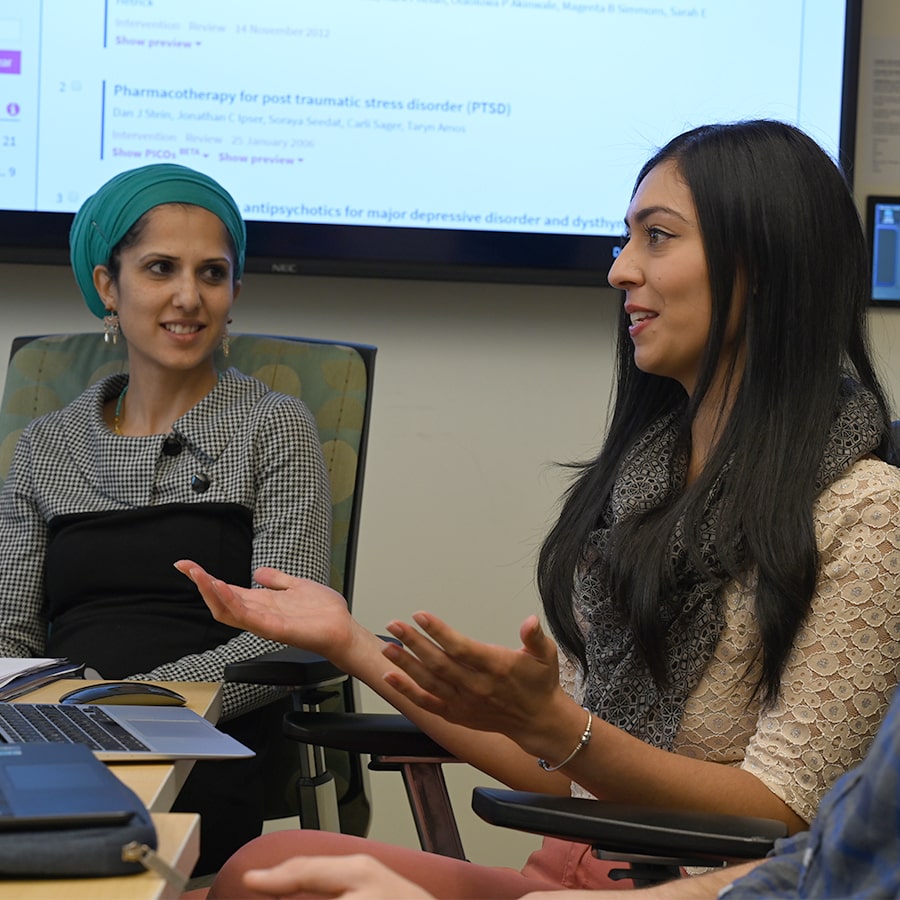Plan Your Education
How to Apply
Admission Requirements
NOTE: If you have only a bachelor’s degree, please indicate on the application form that you’re applying to the MEd program. You will complete the MEd and EdS requirements (total of 66 credits) to get licensed. If you have a completed relevant master’s degree (special education, etc.) please note that you are applying to the EdS program only (minimum 30 credits).
In addition to the criteria below, applicants must meet general graduate admission requirements.
- A completed application and application fee. Application fees are waived for veterans, McNair scholars, and UMass Boston alumni. A limited number of additional application fee waivers are available on a first come first serve basis by request.
- A statement of purpose describing your understanding of school psychology practice and detailing personal career objectives. Please answer this question and not the one from the Office of Graduate Admissions.
- Transcripts of all previous college work, undergraduate and graduate. Undergraduate and graduate cumulative grade point averages (GPA) should be at least 3.0 overall, and 3.0 in psychology courses as well.
- Prerequisite course work includes a minimum of five (5) psychology courses including introductory psychology, human development, and statistics.
- Two letters of recommendation. At least one letter should address academic promise and ability to succeed in advanced graduate training, and at least one letter should address the ability to work with children and adolescents and develop into a thoughtful and responsive practitioner.
- Scores for the Communication & Literacy Skills (reading and writing) portions of the Massachusetts Educator Licensure Test (MTEL). Students may be admitted provisionally without having taken the MTEL, but will be required to take the tests during the first semester of attendance and pass them prior to the internship.
Deadlines & Cost
Deadline: December 1 for a fall start
Application Fee: The nonrefundable application fee is $75. UMass Boston alumni and current students that plan to complete degree requirements prior to graduate enrollment can submit the application without paying the application fee.
Estimate Your Program Cost: Get a feel for your expected program costs using the Graduate Program Cost Calculator.
Program Cost Information: For more detailed information on costs, please visit the Bursar's website.
Curriculum: MEd
Required Courses (36 Credits)
- COUNSL 601 - Research and Evaluation in Psychology 3 Credit(s)
- COUNSL 608 - Psychopathology and Diagnosis 3 Credit(s)
- COUNSL 614 - Counseling Theory and Practice I 3 Credit(s)
- COUNSL 617 - Child and Adolescent Counseling 3 Credit(s)
- COUNSL 632 - Collaborative Consultation in Schools 3 Credit(s)
- SPY G 601 - Issues and Ethics in School Psychology 3 Credit(s)
- SPY G 602 - Standardized Assessment and Report Writing 3 Credit(s)
- SPY G 603 - Foundations of Educational Assessment and Data-Based Decision Making 3 Credit(s)
- SPY G 604 - Social, Emotional, and Behavioral Assessment and Intervention 3 Credit(s)
- SPY G 608 - Systems Consultation, Prevention, and Organizational Change 3 Credit(s)
- SPY G 612 - Learning and the Curriculum 3 Credit(s)
- SPY G 653 - Culturally Responsive Practice & Social Justice in School Psychology 3 Credit(s)
For more information on curriculum, including course descriptions and degree requirements, visit the Academic Catalog.
Curriculum: EdS
Core Courses (48 Credits)
- COUNSL 601 - Research and Evaluation in Psychology 3 Credit(s)
- COUNSL 608 - Psychopathology and Diagnosis 3 Credit(s)
- COUNSL 614 - Counseling Theory and Practice I 3 Credit(s)
- COUNSL 617 - Child and Adolescent Counseling 3 Credit(s)
- COUNSL 632 - Collaborative Consultation in Schools 3 Credit(s)
- COUNSL 650 - Group Counseling for Children and Adolescents 3 Credit(s)
- CSP 660 - Physiological Bases of Behavior 3 Credit(s)
- SPY G 601 - Issues and Ethics in School Psychology 3 Credit(s)
- SPY G 602 - Standardized Assessment and Report Writing 3 Credit(s)
- SPY G 603 - Foundations of Educational Assessment and Data-Based Decision Making 3 Credit(s)
- SPY G 604 - Social, Emotional, and Behavioral Assessment and Intervention 3 Credit(s)
- SPY G 607 - School-Based Interventions and Data-Based Decision Making 3 Credit(s)
- SPY G 608 - Systems Consultation, Prevention, and Organizational Change 3 Credit(s)
- SPY G 612 - Learning and the Curriculum 3 Credit(s)
- SPY G 635 - Behavior Therapy in Schools 3 Credit(s)
- SPY G 653 - Culturally Responsive Practice & Social Justice in School Psychology 3 Credit(s)
Fieldwork Courses (18 Credits)
- SPY G 685 - Practicum I: School-Based Assessment & Intervention 3 Credit(s)
- SPY G 686 - Practicum II: School-Based Assessment & Intervention 3 Credit(s)
- SPY G 689 - Internship in School Psychology 6 Credit(s) - complete two semesters
Elective Course
SPY G 687 - Practicum in School Psychology III may be taken as an elective, but is not required.
Graduation Criteria
MEd
Complete 36 credits from twelve courses including ten required courses and two additional courses.
Prerequisites to full acceptance: Passing scores on the Massachusetts Test for Educator Literacy (MTEL) and a minimum of five courses in psychology including one course in human development (if needed, COUNSL 620 - Life Span Human Development is recommended) and one course in statistics (if needed, PSYCH 270 Psychology Statistics is recommended).
Capstone: Successful completion of a written comprehensive exam after completing 36 credits of coursework.
Statute of limitations: Seven years.
EdS
Complete 66 credits from 20 courses including 16 core courses and four fieldwork courses.
Prerequisites to full acceptance: Passing scores on the Massachusetts Test for Educator Literacy (MTEL) and a minimum of five courses in psychology including one course in human development (if needed, COUNSL 620 - Life Span Human Development is recommended) and one course in statistics (if needed, PSYCH 270 Psychology Statistics is recommended).
Capstone: Successful completion of Praxis II exams and an internship portfolio.
Practicum: Complete 1400 hours of practicum experience.
Students who have completed the School Psychology (MEd) will apply their coursework toward the EdS requirements.
Applicants admitted to the EdS program, who already have a master’s or higher degree in a related field, are eligible for waivers of requirements for comparable courses already completed at the graduate level. Their individual plan of study will be tentatively determined at the interview and formally determined after matriculation, following a review of course descriptions and syllabi.
Students who successfully complete the program are eligible to apply for licensure as a school psychologist in Massachusetts.
Statute of limitations: Three years.
Student Admissions, Outcomes, and Other Data
Contact
Graduate Program Director Tracy Paskiewicz
tracy.paskiewicz [at] umb.edu
(617) 287-7595
Counseling & School Psychology Graduate Programs
csp.admissions [at] umb.edu

Counseling & School Psychology
Learn more about UMass Boston's Counseling & School Psychology department, our research, and our faculty.
Explore the Department of Counseling & School Psychology
College of Education & Human Development
Learn more about the faculty, research, and programs that make up our College of Education & Human Development.
Explore College of Education & Human Development